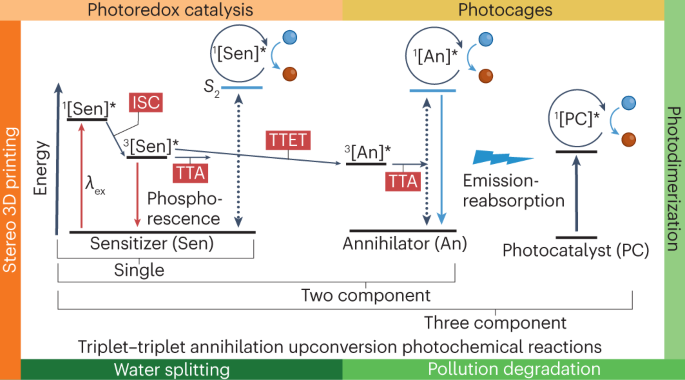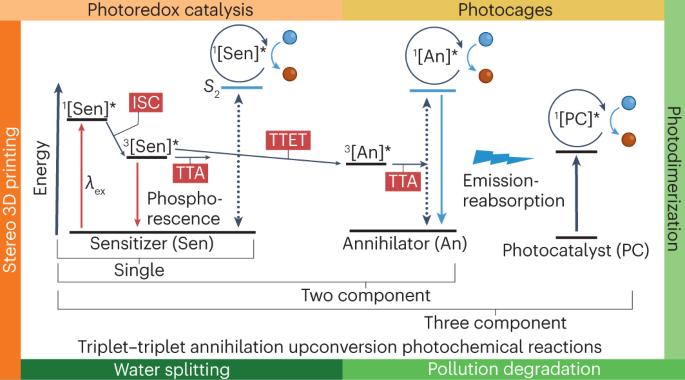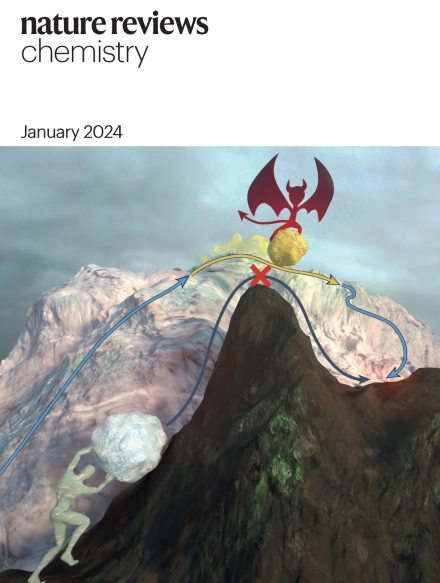Triplet–triplet annihilation photon upconversion-mediated photochemical reactions
IF 38.1
1区 化学
Q1 CHEMISTRY, MULTIDISCIPLINARY
引用次数: 0
Abstract
Photon upconversion is a method for harnessing high-energy excited states from low-energy photons. Such photons, particularly in the red and near-infrared wavelength ranges, can penetrate tissue deeply and undergo less competitive absorption in coloured reaction media, enhancing the efficiency of large-scale reactions and in vivo phototherapy. Among various upconversion methodologies, the organic-based triplet–triplet annihilation upconversion (TTA-UC) stands out — demonstrating high upconversion efficiencies, requiring low excitation power densities and featuring tunable absorption and emission wavelengths. These factors contribute to improved photochemical reactions for fields such as photoredox catalysis, photoactivation, 3D printing and immunotherapy. In this Review, we explore concepts and design principles of organic TTA-UC-mediated photochemical reactions, highlighting notable advancements in the field, as well as identify challenges and propose potential solutions. This Review sheds light on the potential of organic TTA-UC to advance beyond the traditional photochemical reactions and paves the way for research in various fields and clinical applications. Organic-based triplet–triplet annihilation upconversion-mediated photochemical reactions utilize low-energy photons to obtain high-energy excited states leading to notable advancements in photoredox catalysis, photoactivation, 3D printing and immunotherapy. Classifications, design principles, challenges and possible solutions are discussed in this Review.


三重-三重湮灭光子上转换介导的光化学反应。
光子上转换是一种利用低能量光子产生高能激发态的方法。这种光子,尤其是红色和近红外波长范围的光子,可以深入穿透组织,在有色反应介质中的竞争吸收较少,从而提高大规模反应和体内光疗的效率。在各种上转换方法中,基于有机物的三重-三重湮灭上转换(TTA-UC)脱颖而出--它具有上转换效率高、所需激发功率密度低、吸收和发射波长可调等特点。这些因素有助于改进光化学反应,从而应用于光氧化催化、光激活、3D 打印和免疫疗法等领域。在本综述中,我们探讨了有机 TTA-UC 介导的光化学反应的概念和设计原理,重点介绍了该领域的显著进展,同时指出了面临的挑战,并提出了潜在的解决方案。本综述揭示了有机 TTA-UC 超越传统光化学反应的潜力,为各领域的研究和临床应用铺平了道路。
本文章由计算机程序翻译,如有差异,请以英文原文为准。
求助全文
约1分钟内获得全文
求助全文
来源期刊

Nature reviews. Chemistry
Chemical Engineering-General Chemical Engineering
CiteScore
52.80
自引率
0.80%
发文量
88
期刊介绍:
Nature Reviews Chemistry is an online-only journal that publishes Reviews, Perspectives, and Comments on various disciplines within chemistry. The Reviews aim to offer balanced and objective analyses of selected topics, providing clear descriptions of relevant scientific literature. The content is designed to be accessible to recent graduates in any chemistry-related discipline while also offering insights for principal investigators and industry-based research scientists. Additionally, Reviews should provide the authors' perspectives on future directions and opinions regarding the major challenges faced by researchers in the field.
 求助内容:
求助内容: 应助结果提醒方式:
应助结果提醒方式:


